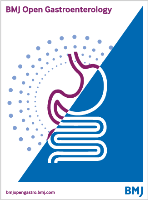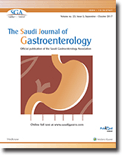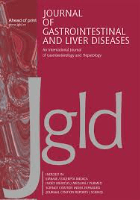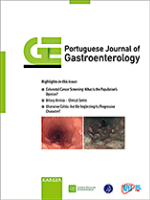
Translational Gastroenterology and Hepatology
Scope & Guideline
Advancing Patient Outcomes through Translational Research.
Introduction
Aims and Scopes
- Gastrointestinal Disorders:
The journal focuses on a wide range of gastrointestinal conditions, including inflammatory bowel disease, colorectal cancer, and esophageal disorders, aiming to improve diagnosis and management through research. - Liver Diseases:
Significant emphasis is placed on liver diseases such as non-alcoholic fatty liver disease (NAFLD), hepatitis, and liver cancer, exploring novel therapeutic strategies and management approaches. - Endoscopic Techniques:
A core area of research includes advancements in endoscopic techniques for diagnosis and treatment, highlighting innovations in procedures like endoscopic resection and interventional endoscopy. - Patient-Centered Research:
The journal prioritizes research that considers patient perspectives, outcomes, and quality of life, particularly in chronic conditions such as irritable bowel syndrome and gastroparesis. - Multidisciplinary Approaches:
The integration of various specialties in the management of gastrointestinal and liver diseases is emphasized, promoting collaborative research that spans surgery, oncology, gastroenterology, and nutrition.
Trending and Emerging
- Artificial Intelligence in Endoscopy:
The integration of artificial intelligence (AI) in endoscopic practices is gaining traction, with studies exploring its potential for improving diagnostic accuracy and procedural outcomes. - Chronic Liver Disease Management:
Research on the management of chronic liver diseases, including innovative therapeutic strategies for NAFLD and liver cancer, has surged, reflecting a growing recognition of these conditions' global impact. - Mental Health and Gastrointestinal Disorders:
There is an increasing focus on the intersection of mental health and gastrointestinal diseases, particularly in understanding how psychological factors influence conditions like irritable bowel syndrome. - Nutritional Interventions:
Emerging interest in dietary approaches, particularly plant-based diets, as therapeutic interventions for gastrointestinal conditions demonstrates a shift towards holistic management strategies. - Racial and Ethnic Disparities in Gastroenterology:
Research addressing disparities in the presentation and management of gastrointestinal diseases among different racial and ethnic groups is on the rise, emphasizing the need for equitable healthcare practices.
Declining or Waning
- Pediatric Gastroenterology:
Research specifically targeting pediatric gastrointestinal disorders has seen a decrease, possibly due to a broader focus on adult populations and complex diseases affecting adults more frequently. - Traditional Surgical Techniques:
There is a noticeable decline in the emphasis on traditional surgical approaches in favor of minimally invasive techniques and endoscopic innovations, indicating a shift towards less invasive treatment modalities. - Basic Science Studies:
The journal appears to be moving away from purely basic science studies that do not directly translate to clinical applications, favoring research that demonstrates clear clinical relevance. - Single-Center Studies:
The prevalence of single-center studies has decreased, as the journal increasingly favors multi-institutional collaborations that provide more robust and generalizable data. - Ethics in Gastroenterology:
Discussions surrounding ethical considerations in gastroenterology practices are less prominent, possibly overshadowed by more pressing clinical and technological advancements.
Similar Journals

Gut and Liver
Transforming patient care through innovative research.Gut and Liver is a prestigious peer-reviewed journal dedicated to advancing the fields of Gastroenterology and Hepatology. Published by the EDITORIAL OFFICE GUT & LIVER in South Korea, this Open Access journal has been disseminating valuable research findings since 2007, making critical knowledge accessible to a global audience. With an impressive 2023 impact factor that places it in Q1 rank in both Gastroenterology (#28/167) and Hepatology (#22/82), it is recognized as a leader in the medical domain. The journal covers diverse topics, including innovative therapeutic strategies, clinical practices, and groundbreaking research in liver diseases and gastrointestinal disorders, thereby playing a vital role in improving patient care and outcomes. Researchers, healthcare professionals, and students can benefit from the journal's wealth of information, designed to foster collaboration and spark new ideas within the scientific community. For further engagement with current research, readers can access issues from 2009 to 2024 and stay updated on the latest advancements in the field.

BMJ Open Gastroenterology
Connecting Researchers for a Healthier Gastrointestinal FutureBMJ Open Gastroenterology is a premier open access journal published by the esteemed BMJ Publishing Group, focusing on the dynamic and evolving field of gastroenterology. Established in 2014, the journal has rapidly ascended in stature, reflected in its impressive 2023 Q1 ranking in gastroenterology and its position within the top 25% of journals in the category according to Scopus. With a mission to disseminate high-quality, peer-reviewed research with global significance, the journal provides a vital platform for researchers, professionals, and students alike to share their findings and advancements in gastrointestinal medicine. Operating from its headquarters in London, England, the journal's open access format ensures wide visibility and accessibility of cutting-edge research, making it an invaluable resource for those dedicated to improving patient care and driving innovation in gastroenterological sciences. By engaging with this journal, contributors and readers can stay at the forefront of critical developments in the field, fostering a collaborative environment for knowledge exchange.

Saudi Journal of Gastroenterology
Elevating standards in gastrointestinal research and practice.The Saudi Journal of Gastroenterology is a premier platform dedicated to advancing research and clinical practice in the field of gastroenterology. Published by Wolters Kluwer Medknow Publications, this open-access journal has been serving the academic community since 1995 from its base in India. With an ISSN of 1319-3767 and an E-ISSN of 1998-4049, the journal allows unrestricted access to a wealth of knowledge, fostering an environment where researchers, professionals, and students can engage with cutting-edge studies. As of 2023, it is categorized in the Q3 quartile within gastroenterology, ranking #74 out of 167 in Scopus, which places it within the 55th percentile of its field. The journal aims to disseminate significant findings, clinical trials, and innovative theories that shape the understanding of gastrointestinal disorders and practices. With a commitment to quality and relevance, the Saudi Journal of Gastroenterology is pivotal for anyone seeking to enhance their knowledge and expertise in this vital area of medicine.

Pediatric Gastroenterology Hepatology & Nutrition
Illuminating the path to better nutrition and gastrointestinal health.Pediatric Gastroenterology Hepatology & Nutrition is a pivotal academic journal published by the Korean Society of Pediatric Gastroenterology & Nutrition, focusing on the critical fields of pediatric gastroenterology, hepatology, and nutrition. Located in South Korea, this journal aims to disseminate high-quality research, review articles, and clinical studies to advance knowledge and practice in the care of children with gastrointestinal and nutritional disorders. With a Converged Years span from 2012 to 2024 and categorized in the Q2 and Q3 quartiles in 2023 across multiple related fields, the journal holds a significant position within the academic community, reflecting its impactful contribution to the discipline. Although currently not open access, the journal ensures that content is accessible to a broad audience through various institutional subscriptions. The journal appeals to researchers, healthcare professionals, and students alike, providing an essential platform for the exchange of innovative ideas and research findings aimed at improving pediatric patient care.

JOURNAL OF GASTROENTEROLOGY
Innovating insights for improved patient outcomes.JOURNAL OF GASTROENTEROLOGY, published by SPRINGER JAPAN KK, is a premier academic journal that has been at the forefront of gastrointestinal research since its inception in 1994. With an impressive Impact Factor and ranking in the top quartile (Q1) of its category, this journal holds a significant place in the field of gastroenterology, currently ranked 12th out of 167 in Scopus, placing it in the 93rd percentile. The journal serves as an essential platform for disseminating innovative research, clinical studies, and reviews that foster advancements in the understanding and treatment of gastrointestinal diseases. Although it does not offer Open Access options, it provides researchers, clinicians, and students access to crucial insights and breakthroughs pivotal to improving patient care and outcomes in gastroenterology. With a commitment to high-quality peer-reviewed content, JOURNAL OF GASTROENTEROLOGY plays a vital role in shaping the future of gastrointestinal health and research.

Clinical Gastroenterology and Hepatology
Unveiling New Horizons in Gastroenterology and HepatologyClinical Gastroenterology and Hepatology, published by Elsevier Science Inc, stands as a leading journal in the fields of gastroenterology and hepatology. With an ISSN of 1542-3565 and an E-ISSN of 1542-7714, this esteemed publication has earned its place in the top quartile (Q1) of both gastroenterology and hepatology categories as of 2023, ranking 6th out of 167 and 7th out of 82 respectively. The journal aims to disseminate innovative research, clinical studies, and case reports that advance the understanding and treatment of gastrointestinal and liver diseases. Targeted towards researchers, healthcare professionals, and students, it provides crucial insights into emerging therapies and medical advancements. Clinical Gastroenterology and Hepatology is not only a pivotal resource for contemporary gastroenterological research but also fosters collaboration and knowledge-sharing within the medical community. With a converging publication history from 2003 to the present, the journal continues to build on its solid foundation of scientific excellence and relevance.

Journal of Gastrointestinal and Liver Diseases
Elevating Research in Gastroenterology and HepatologyThe Journal of Gastrointestinal and Liver Diseases, published by MEDICAL UNIV PRESS in Romania, serves as a pivotal platform for the dissemination of significant research in the fields of gastroenterology and hepatology. Established in 2006, this journal has evolved over the years, currently holding a Q3 rank in Gastroenterology and a Q2 rank in Medicine (miscellaneous), reflecting its commitment to high-quality scholarship and impactful contributions to medical science.
With an ISSN of 1841-8724 and an E-ISSN of 1842-1121, the journal engages a diverse readership of researchers, clinicians, and students passionate about advancing knowledge in gastrointestinal and liver health. While it currently does not operate under an open access model, the journal remains a vital resource for those seeking to stay updated on the latest developments and emerging trends in the field. As it converges towards a broader impact, projected through its coverage until 2024, the Journal of Gastrointestinal and Liver Diseases continues to contribute to the academic landscape, encouraging innovation and comprehensive understanding in digestive health.

Clinics in Liver Disease
Unveiling the complexities of hepatology for better care.Clinics in Liver Disease is an esteemed peer-reviewed journal published by W B Saunders Co-Elsevier Inc, dedicated to advancing the field of hepatology. Established in 1997 and covering a broad range of topics within liver disease research, this journal serves as a vital resource for researchers, clinicians, and students engaged in the study of liver health and diseases. With a commendable impact factor placing it within the Q2 category in Hepatology and ranking #32 out of 82 in the Scopus classifications, it consistently disseminates high-quality research and clinical insights. The journal’s commitment to promoting understanding and management of liver diseases is reflected in its rigorous editorial standards and comprehensive review processes. Although not an open-access publication, Clinics in Liver Disease offers subscription options that ensure accessibility to up-to-date research and reviews critical for both academic and clinical success.

Gastroenterology
Pioneering Insights for Enhanced Patient CareGastroenterology, published by W B Saunders Co-Elsevier Inc, is a premier journal dedicated to advancing the knowledge and practice within the fields of gastroenterology and hepatology. Established in 1945 and covering a wide range of topics related to digestive health, this journal holds a distinguished position in the academic community, as evidenced by its impressive Q1 status in both Gastroenterology and Hepatology categories, and its high rankings (4th in both disciplines) in Scopus, placing it in the top percentile for scholarly impact. With its commitment to publishing high-quality research, reviews, and clinical studies, Gastroenterology provides an essential resource for researchers, healthcare professionals, and students seeking cutting-edge insights that inform clinical practices and enhance patient care. Although it does not currently offer open access, the journal continues to serve as a vital platform for disseminating meaningful research that shapes the future of digestive disease management.

GE Portuguese Journal of Gastroenterology
Elevating Standards in Gastroenterology Research and PracticeThe GE Portuguese Journal of Gastroenterology, published by KARGER, is a prominent platform in the field of gastroenterology, providing a vital forum for the dissemination of high-quality research since its establishment. With an open access model implemented in 2012, the journal ensures that emerging findings in gastrointestinal health are readily accessible to a global audience, facilitating the exchange of critical knowledge among researchers, practitioners, and students alike. Based in Switzerland, this journal has earned a respected position within the academic community, currently holding a Q3 ranking in the gastroenterology category for 2023, alongside a Scopus rank of #113 out of 167 in its field. Spanning converged years from 2014 to 2024, the GE Portuguese Journal of Gastroenterology aims to bridge gaps in research and practice, fostering collaboration and innovation across diverse areas within the discipline. Authors and readers alike benefit from the journal's commitment to advancing knowledge and practice in gastroenterology.